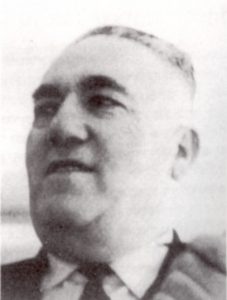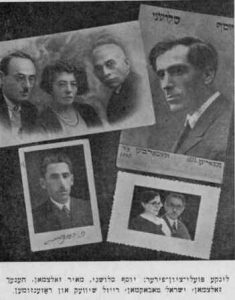
The largest was the leather industry. There were approximately 500 shoemakers, boots’ manufacturers, shoes’ shiners and sports equipment manufacturers. The second place was taken by the needle sector workers, with 400 workers-tailors.
Wages and working conditions were very poor: contract work, low wages, payment in bills and bonds instead of actual money and the absence of any social insurance.
Workers’ unions were not responsible only concerning work issues, the unemployed, the problems created in off-season, providing social assistance during the winter, and the like, but also conducted cultural activities: meetings, lectures and Q & A. The leather workers union, which was under the influence of “Reds” (the communist group) had an active drama club and choir. We’ve often “crashed” opponents’ activities who set up riots and interfered during events, until a “third party” – the police, interfered and usually disbanded the meeting and arrested several participants for Communist activity.

After Sloshni’s death a struggle broke out between the “Bund”, the “Red” and “Poalei Zion Left”. Since the warring parties had no logical-ideological arguments to attract workers from this to the other side, they used violence, intrigues and scandals. The union weakened. Money to pay the rent ran out, and the Union of Workers of the needle was evicted from office and moved in with the leather Workers Union on 4 Milana Street.
As chairman of needle Workers Union was, at the time, the famous Bund activist M. Greenberg, and Friedrich was the secretary. The union offices were located on Milana Street, but the workers could be found in groups, immersed in heated debates in the town hall square and in the Great Synagogue, between “Mincha” and “Maariv”. They didn’t come to pray, but to discuss cardinal issues, conduct propaganda among the Jews and devise solutions for the redemption of mankind.
The Tricot industry began to develop in Siedlce after the Poland-Russia war. By 1930 it progressed by leaps and bounds. Siedlce was considered one of the largest centers of the industry in Poland. In high season about 60 machines worked in the city 24 hours a day!
The Tricot industry workers came primarily from circles considered “home-owner.” Young, married, who didn’t succeed in trade and sought their own livelihood. They turned to this profession which was easy to learn and provided good earnings.

At the height of the season the Tricot industry employed, along with members of the section of “Sidlkoba”, workers from Morad and other towns in the Siedlce region – about 800 people. Many of them specialized in their profession and moved to Warsaw and even abroad – Belgium, France and South America. In the ’50s they took a respectable place in the textile industry in these countries.
Among Siedlce’s breadwinners were also many unorganized workers, such as construction workers, plasterers, painters, carpenters, and hatters. Before World War II, a branch of trade union workers was established – for salesclerks, packing workers and clerks, under the direction of Haiim Reiza.
The Jewish workers in Siedlce, like the Polish workers as a whole, often felt the bitter taste of a severe economic crisis.
An article published in “Siedlce Weekly” magazine describes the lives of workers in the city in the difficult “Dead season” –
From morning until they can be found in the labor market in front of City Hall. They stand in groups, long lines, unemployed, struck by time.
Starving people, skeletons-like green faces. They want to rent out their callused hands, but no one needs them.
Many of those here have a wife and small children waiting for them at home. The house is cold, the walls are dripping drops of water and the small children are asking all the time: “Food! Mom!”
When evening comes you can meet many of them in the synagogue. They go there for a little warmth. They sit on a long bench by the stove, swallow their spittle and each asks himself: where will my help come from?
Here, too, at the synagogue, they sit in groups, as at the club. Discussing wars, global politics or the economic crisis. Attention is drawn to a Jew in tattered clothes, his face full of sorrow.
He tells his audience he has a wife and six children at home, and in addition to them – a son in law who lives with them, and no income. Last year, he said, it was still possible to get along somehow. There was a little help for the unemployed granted by the municipality and the community. The children had a spoon of warm meal, some coal and wood for heating. You could survive somehow. But now – nothing. No help can be seen or heard. In such a situation all that’s left is to die of starvation.
“Indeed,” everyone around agrees.
A second, younger, worker, class-conscious, spills all the anger of his starving stomach on the heads of Public officials, all those who “worry” for us. Even our workers-unions activists – he claims – are not ready to even think about the catastrophic situation prevailing during the “dead season”.
“Yes, yes, dead season”, follows another young man, pretty optimistic; who believes this situation will not last forever. “In fact, all workers should be registered in the government employment office. But how can you arrange it with Jewish employers who always fear high taxes?”
“But, gevalt what should we do?” An elderly man, father of four children, including two daughters, cries out. “Where will I get the money to buy shoes for the children? It is impossible to walk barefoot! And most important – money for bread, for potatoes!” With watery eyes and a choked voice he continues: “Although everything is cheap, “all for a penny”, but we haven’t a penny!”
A Sad and pitiful picture.
